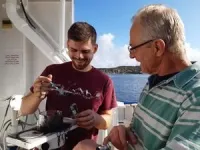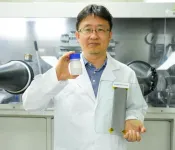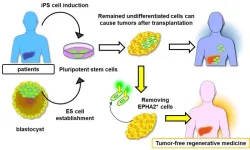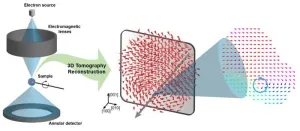(Press-News.org) The world-famous Roman Baths are home to a diverse range of microorganisms which could be critical in the global fight against antimicrobial resistance, a new study suggests.
The research, published in the journal The Microbe, is the first to provide a detailed examination of the bacterial and archaeal communities found within the waters of the popular tourist attraction in the city of Bath (UK).
Scientists collected samples of water, sediment and biofilm from locations within the Roman Baths complex including the King’s Spring (where the waters reach around 45°C) and the Great Bath, where the temperatures are closer to 30°C.
The samples were then analysed using cutting edge sequencing technology and traditional culturing techniques were employed to isolate bacteria with antibiotic activity.
Around 300 distinct types of bacteria were isolated across the Roman Baths site – among them the key candidate groups, Actinobacteria and Myxococcota, known for antibiotic production – with different examples being more prominent within the varying water temperatures.
Further tests showed 15 of these isolates – including examples of Proteobacteria and Firmicutes – showed varying levels of inhibition against human pathogens including E.coli, Staphylococcus Aureus and Shigella flexneri.
The research comes at a time when the need for new sources of antibiotics is at unprecedented levels, with resistance of bacteria to currently used medication estimated to be responsible for more than 1.25million deaths globally each year.
Writing in the study, scientists say a significant amount of additional investigation is required before the microorganisms found in the Roman Baths can be applied in the fight against disease and infection globally.
However, they add that this initial study has shown there is clear potential for novel natural products contained within its hot springs to be explored further for that purpose.
The research was carried out by students and academics from the University of Plymouth’s School of Biomedical Sciences and School of Biological and Marine Sciences, working closely with staff at the Roman Baths.
Dr Lee Hutt, Lecturer in Biomedical Sciences at the University of Plymouth, is the study’s senior author. He said: “This is a really important, and very exciting, piece of research. Antimicrobial resistance is recognised as one of the most significant threats to global health, and the hunt for novel antimicrobial natural products is gathering pace. This study has for the first time demonstrated some of the microorganisms present within the Roman Baths, revealing it as a potential source of novel antimicrobial discovery. There is no small irony in the fact the waters of the Roman Baths have long been regarded for their medicinal properties and now, thanks to advances in modern science, we might be on the verge of discovering the Romans and others since were right.”
The Roman Baths has been welcoming visitors for almost two millennia, and in 2023 more than one million people toured its hot springs and other collections.
Zofia Matyjaszkiewicz, Collections Manager at the Roman Baths and a co-author of the new study, added: “People have visited the springs in Bath for thousands of years, worshipping at, bathing in and drinking the waters over the centuries. Even in the Victorian period the Spa Treatment Centre in Bath used the natural spring waters for their perceived curative properties in all sorts of showers, baths and treatments. It’s really exciting to see cutting edge scientific research like this taking place here, on a site with so many stories to tell.”
The research is now being expanded through a PhD studentship, which will represent the first in-depth study of a UK thermal hot spring focused on antimicrobial discovery.
Scheduled to begin in October 2024, it will apply a variety of techniques to screen microorganisms found in the Roman Baths for antimicrobial activity, with a view to identifying which might have the potential for future clinical use.
END
Could the world famous Roman Baths help scientists counter the challenge of antibiotic resistance?
2024-05-31
ELSE PRESS RELEASES FROM THIS DATE:
Fast charging electric vehicles with stable high-energy density lithium-ion batteries
2024-05-31
A research team led by Dr. Choi Jeong Hee at the Korea Electrotechnology Research Institute (KERI) Battery Materials and Process Research Center, in cooperation with a Hanyang University team mentored by Professor Lee Jong-Won and a Kyunghee University team mentored by Professor Park Min-Sik, developed a core technology to ensure the charging/discharging stability and long-life of lithium-ion batteries under fast-charging conditions.
A crucial prerequisite for the widespread adoption of electric vehicles (EVs) is the enhancement of lithium-ion battery performance in terms of driving ...
Tackling the hurdle of tumor formation in stem cell therapies
2024-05-31
Ikoma, Japan – Pluripotent stem cells (PSCs) are a type of stem cells capable of developing into various cell types. Over the past few decades, scientists have been working towards the development of therapies using PSCs. Thanks to their unique ability to self-renew and differentiate (mature) into virtually any given type of tissue, PSCs could be used to repair organs that have been irreversibly damaged by age, trauma, or disease.
However, despite extensive efforts, regenerative therapies involving PSCs still have many hurdles to overcome. One being the formation of tumors (via ...
A 20-year-old puzzle solved: KAIST research team reveals the 'three-dimensional vortex' of zero-dimensional ferroelectrics
2024-05-31
Materials that can maintain a magnetized state by themselves without an external magnetic field (i.e., permanent magnets) are called ferromagnets. Ferroelectrics can be thought of as the electric counterpart to ferromagnets, as they maintain a polarized state without an external electric field. It is well-known that ferromagnets lose their magnetic properties when reduced to nano sizes below a certain threshold. What happens when ferroelectrics are similarly made extremely small in all directions (i.e., into a zero-dimensional structure such as nanoparticles) has been a topic of controversy for a long time.
The research team led by Dr. Yongsoo ...
Children’s Hospital Los Angeles team finds new potential causes of rare and lethal bone cancer
2024-05-31
Little is known about the genetics and biology of chordoma, a rare and aggressive bone tumor. Chordomas occur in approximately one in a million people in the U.S. a year and only five percent of these are in children. These tumors can arise anywhere along the spine in adults. However, in children these tumors occur mostly at the base of the skull, making complete surgical removal challenging or impossible. Any tumor remnants are treated with high doses of radiation—which can cause significant damage to the developing brain.
A team of researchers led by Xiaowu Gai, PhD and Jaclyn Biegel, PhD, FACMG, at the Center for Personalized Medicine ...
One in four Thai concerned about colorectal cancer screening cost
2024-05-31
According to research led by Prof. Varut Lohsiriwat, Professor of Surgery, Division of General Surgery (Section of Colorectal Surgery) of Siriraj Hospital, at Mahidol University, CRC is the third most common cancer in Thailand, accounting for 11% of the cancer burden. It is the only malignancy with an increased incidence in both genders in the country.
By 2040, the burden of CRC is projected to increase to 3.2 million new cases and 1.6 million deaths per year representing a 66% and 71% rise in new cases and deaths respectively relative ...
Infants hear significantly more speech than music at home, UW study finds
2024-05-31
Speech and music are the dominant elements of an infant’s auditory environment. While past research has shown that speech plays a critical role in children’s language development, less is known about the music that infants hear.
A new University of Washington study, published May 21 in Developmental Science, is the first to compare the amount of music and speech that children hear in infancy. Results showed that infants hear more spoken language than music, with the gap widening as the babies get older.
“We wanted to get a snapshot of what’s happening in infants’ home environments,” said corresponding author ...
New coral disease forecasting system led by University of Hawai'i team
2024-05-31
Research led by the University of Hawaiʻi at Mānoa Hawaiʻi Institute of Marine Biology (HIMB) has led to a new tool for forecasting coral disease that could help conservationists step in at the right times with key interventions. Ecological forecasts are critical tools for conserving and managing marine ecosystems, but few forecasting systems can account for the wide range of ecological complexities in near-real-time.
Using ecological and marine environmental conditions, the Multi-Factor Coral Disease Risk product predicts the risk of two diseases across reefs in the central and western Pacific and along the east coast of Australia. An article ...
Tobacco funded research still appearing in top medical journals
2024-05-31
Tobacco-funded research is still appearing in highly-cited medical journals - despite attempts by some to cut ties altogether, finds an investigation by The Investigative Desk and The BMJ today.
Although the tobacco industry has a long history of subverting science, most leading medical journals don’t have policies which ban research wholly or partly funded by the industry.
And even when publishers, authors and universities are willing to restrict tobacco industry ties, they struggle ...
Trout in mine-polluted rivers are genetically ‘isolated’
2024-05-31
Trout living in rivers polluted by metal from old mines across the British Isles are genetically “isolated” from other trout, new research shows.
Researchers analysed brown trout at 71 sites in Britain and Ireland, where many rivers contain metal washed out from disused mines.
While trout in metal-polluted rivers appear healthy, they are genetically distinct – and a lack of diversity in these populations makes them vulnerable to future threats.
By comparing the DNA of trout in rivers with and without metal pollution, the researchers found that metal-tolerant trout ...
How researchers are protecting AI of the future
2024-05-31
Trust is vital to the widespread acceptance of AI across industries, especially when safety is a concern. For example, people may be hesitant to ride in a self-driving car knowing that the AI running it can be hacked. One barrier to increasing trust is that the algorithms powering AI are vulnerable to such attacks.
Dr. Samson Zhou, assistant professor in the Department of Computer Science and Engineering at Texas A&M University, and Dr. David P. Woodruff, professor in the Computer Science Department at Carnegie Mellon University, hope to strengthen algorithms used by big data AI models against attacks. Big data AI models are ...









